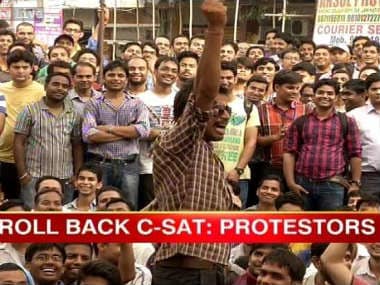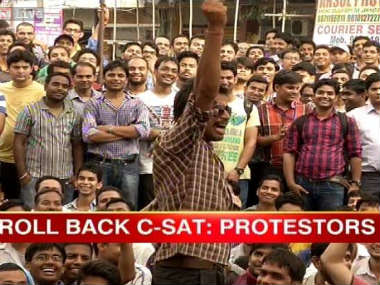Grappling with the language row in the Civil Services Aptitude Test (CSAT) format of the civil services preliminary exam, the government today informed Parliament that it is in receipt of the Arvind Varma committee report and will take a decision on the matter soon. However, with news coming out that the panel was not in favour of changes in the pattern of the question paper based on language, the matter now threatens to exacerbate the volatile situation. A section of Hindi-speaking students have been protesting the CSAT paper for almost two months saying that it discriminates against Hindi-speaking students and favours those who are more comfortable with English. The pattern of the civil services preliminary exam was changed in 2011 as per the recommendations of the Alagh Committee, the Second Administrative Reforms Commission and an expert committee constituted by UPSC under the chairmanship of former UGC chief SK Khanna. The changes were also approved in Parliament but the dissenting voices against the so-called language problem remained muted so far. A big divide has occurred as a large section of the people want the question pattern to remain as it is while there are some who have even resorted to vandalism to protest the same. [caption id=“attachment_1642361” align=“alignleft” width=“380”]  Students protesting against the UPSC exam. Image from ibnlive[/caption] “Academic affairs and the academicia should be out of politics. The debate is created by those political forces who are scared of the Uttar Pradesh elections. The panel has just given the report. Please do not preempt what the government is going to do. We do not want any student to suffer. This is not a language divide situation,” BJP spokesperson Vani Tripathi Tikoo told Times Now during a panel discussion. “All policy decisions were taken during the UPA time. It is the Bahujan Samaj Party and the Samajwadi Party along with the Congress that is making the loudest noise,” Tikoo said in an attempt to push the blame to the opposition parties. What was surprising is that Congress took an absolute 180 degree turn when pushed into a corner. Party spokesperson Salman Soz said, “It is the comprehension that is important and not the language. It is imperative upon the present day government to take a decision (preferring to stay mum on the issue that the UPA did nothing from August 2011 to May 2014). The government should decide as soon as possible taking one side or the other. They cannot leave the country in the lurch.” Manipal Global Education chairman TV Mohandas Pai did not see any reasoning to this whole protest. “Only some 1,500 students in all likelihood linked to some political party or the other are creating problems. They are trying to browbeat the country by running amok in the streets of Delhi. If they cannot speak basic English we do not need them as administrative officers. These are minimum qualifications. A person may be a first class MA in Kannada language but what language will he speak in Uttar Pradesh? We are talking about the top 500 people in the country. If they do not have the knowledge of basic English, how could they aspire to lead the country?” asked Pai. It is important to mention that even vernacular medium schools across all boards in the country teach English up to class 10. The English being used in the CSAT model is of matric-level, prompting academia to support the model of the question paper as it is. Career counsellor Naveen Chopra hoped that the government would not succumb to the hooliganism shown on the streets. “The country can suffer but the students should not. This cannot be a logic for the political parties if they are really working in the interest of the country. If anybody goes wild on the street it does not mean you change the policy. The political parties seem to be more inretested in the vote bank politics rather than think of the country itself. The English used in the CSAT is simple. One need to have the brains to figure this out,” Chopra said. One of the civil services aspirant Smita Jha, who participated in the debate, also spoke in favour of English. “There are any number of languages spoken in India. English serves as a link language. We should see what the requirement if the exam is. All the file notings, office circulars are in English. People who clears foreign services will be deployed abroad and it is pertinent for them to know English. Even in the country’s North East and southern parts English is needed to communicate,” Jha said. Another civil services aspirant Subhas Gowda, who was not in favour of English, said, “English should not be the parameter to decide if anyone will be a good administrative officer or not.” Unless a level-playing field is reached soon, the turmoil on the streets is likely to continue. With the UPSC willing to go ahead with its scheduled preliminary exam on 24 August, the action may shift outside the examination hall rather than inside.
A big divide has occurred as a large section of the people want the question pattern to remain as it is while there are some who have even resorted to vandalism to protest the same.
Advertisement
End of Article


)

)
)
)
)
)
)
)
)



